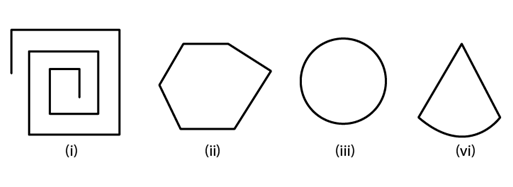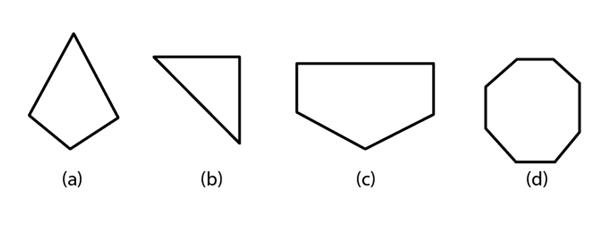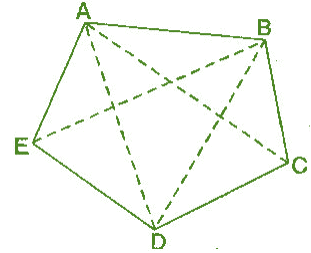NCERT Solutions for Class 8 Maths Chapter 5 - Understanding Elementary Shapes (Exercise 5.7 and 5.8)
Exercise 5.7
Q1. Say true or false:
(a) Each angle of a rectangle is a right angle.
(b) The opposite sides of a rectangle are equal in length.
(c) The diagonals of a square are perpendicular to one another.
(d) All the sides of a rhombus are of equal length.
(e) All the sides of a parallelogram are of equal length.
(f) The opposite sides of a trapezium are parallel.
Ans: (a) True
(b) True
(c) True
(d) True
(e) False
(f) False
Q2. Give reasons for the following:
(a) A square can be thought of as a special rectangle.
(b) A rectangle can be thought of as a special parallelogram.
(c) A square can be thought of as a special rhombus.
(d) Squares, rectangles, parallelograms are all quadrilateral.
(e) Square is also a parallelogram.
Ans: (a) Because its all angles are right angle and opposite sides are equal.
(b) Because its opposite sides are equal and parallel.
(c) Because its four sides are equal and diagonals are perpendicular to each other.
(d) Because all of them have four sides.
(e) Because its opposite sides are equal and parallel.
Q3. A figure is said to be regular if its sides are equal in length and angles are equal in measure. Can you identify the regular quadrilateral?
Ans: A square is a regular quadrilateral because all the interior angles are 90o, and all sides are of the same length.
Exercise 5.8
Q1. Examine whether the following are polygons. If anyone among these is not, say why? Ans: (a) As it is not a closed figure, therefore, it is not a polygon.
Ans: (a) As it is not a closed figure, therefore, it is not a polygon.
(b) It is a polygon because it is closed by line segments.
(c) It is not a polygon because it is not made by line segments.
(d) It is not a polygon because it not made only by line segments, it has curved surface also.
Q2. Name each polygon: Make two more examples of each of these.
Make two more examples of each of these.
Ans: (a) Quadrilateral
(b) Triangle
(c) Pentagon
(d) Octagon
Q3. Draw a rough sketch of a regular hexagon. Connecting any three of its vertices, draw a triangle. Identify the type of the triangle you have drawn.
Ans: ABCDEF is a regular hexagon and triangle thus formed by joining AEF is an isosceles triangle.
Q4. Draw a rough sketch of a regular octagon. (Use squared paper if you wish). Draw a rectangle by joining exactly four of the vertices of the octagon.
Ans: ABCDEFGH is a regular octagon and CDGH is a rectangle.
Q5. A diagonal is a line segment that joins any two vertices of the polygon and is not a side of the polygon. Draw a rough sketch of a pentagon and draw its diagonals.
Ans: ABCDE is the required pentagon and its diagonals are AD, AC, BE and BD.

Exercise 5.9 (Old NCERT)
Ques 1: Match the following:
| (a) Cone |  |
| (b) Sphere |  |
| (c) Cylinder |  |
| (d) Cuboid |  |
| (e) Pyramid |  |
Give two example of each shape.
Ans:
| (a) Cone |  |
| (b) Sphere |  |
| (c) Cylinder |  |
| (d) Cuboid |  |
| (e) Pyramid |  |
Ques 2: What shape is:
(a) Your instrument box?
(b) A brick?
(c) A match box?
(d) A road-roller?
(e) A sweet laddu?
Ans: (a) Cuboid
(b) Cuboid
(c) Cuboid
(d) Cylinder
(e) Sphere
|
82 videos|273 docs|69 tests
|






















